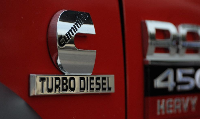Types of Oil
#12
#13
If you decide to switch your truck to synthetic oil, the hardest part may be researching the various brands available. No special procedure, no flushing, is required to switch your truck over to synthetic oil; it's the same as a regular oil change, although some mechanics recommend that you change the oil about three months after the initial switch to get rid of any remaining sludge from conventional oil that might still lurk in your car. The only manufacturer that advises against use of synthetic oil that I know of is Mazda.
There's also the question of temperature and viscosity, or thickness of the oil. You can buy different weights of oil as said above, they are designed to work better in different temperatures, of course, but there will still be a variance in that oil's thickness depending on the trucks operating temperature and outside weather conditions. Oil that is too thick takes longer to work its way through your truck; oil that's too thin does not lubricate as well, and is more likely to slip out of imperfections in your seals, gaskets and joints, resulting in small oil leaks. Synthetic oil remains remarkably stable under extreme temperature conditions. In cold weather, you can still easily pour synthetic oil at temperatures that would render conventional oil thicker than the proverbial molasses in weather. In very warm weather or in trucks with high operating temperatures , synthetic oil retains an effective thickness, while regular oil thins quickly and doesn't do as good a job.
The properties of synthetic oil enable it to leave a film of lubrication on metal parts that stays in place. This means there is some lubricant present at the moment you start your truck, resulting in less wear and tear on metal parts. Less wear and tear means a better-functioning, longer-lived engine, and one that doesn't have to work quite so hard. And if your engine doesn't have to work quite so hard, it uses less fuel. Users of synthetic oil have claimed increases in their fuel mileage ranging from 2-5%. Hope this will help you make a proper choice............................................ .................................................. ..............................................
There's also the question of temperature and viscosity, or thickness of the oil. You can buy different weights of oil as said above, they are designed to work better in different temperatures, of course, but there will still be a variance in that oil's thickness depending on the trucks operating temperature and outside weather conditions. Oil that is too thick takes longer to work its way through your truck; oil that's too thin does not lubricate as well, and is more likely to slip out of imperfections in your seals, gaskets and joints, resulting in small oil leaks. Synthetic oil remains remarkably stable under extreme temperature conditions. In cold weather, you can still easily pour synthetic oil at temperatures that would render conventional oil thicker than the proverbial molasses in weather. In very warm weather or in trucks with high operating temperatures , synthetic oil retains an effective thickness, while regular oil thins quickly and doesn't do as good a job.
The properties of synthetic oil enable it to leave a film of lubrication on metal parts that stays in place. This means there is some lubricant present at the moment you start your truck, resulting in less wear and tear on metal parts. Less wear and tear means a better-functioning, longer-lived engine, and one that doesn't have to work quite so hard. And if your engine doesn't have to work quite so hard, it uses less fuel. Users of synthetic oil have claimed increases in their fuel mileage ranging from 2-5%. Hope this will help you make a proper choice............................................ .................................................. ..............................................



